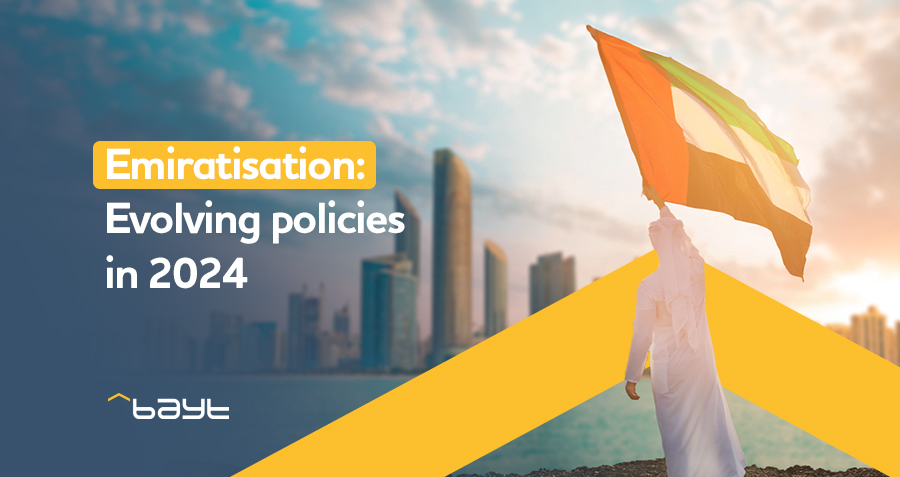![]()
Ready To Start Hiring?
Successful hiring starts with a simple step
Are you ready for the new changes in hiring UAE nationals in 2024? As businesses continue operations in the UAE, we’re witnessing a significant shift in the government’s Emiratisation policies this year. These evolving Emiratisation policies in 2024 are aimed at boosting the employment of UAE nationals across all sectors.
Furthermore, the evolving Emiratisation policies in 2024 are important for diversifying the economy and reducing the UAE’s reliance on international workers. This will foster a local job market rich in diversity and opportunities. So, continue reading to learn more about the UAE’s evolving policies in 2024!
Here are a few important things to note from Emiratisation’s evolving policies in 2024
As part of Emiratisation policies in 2024, if an employer has a company with 20 to 49 workers, they need to hire at least one Emirati. The next year, they’ll need to hire another one. This requirement will increase to two Emirati employees by 2025.
This marks a significant shift from earlier policies, which focused on larger entities with over 50 employees. For employers, this means rethinking recruitment strategies and opening doors to the local talent pool, enriching their teams with local insights and expertise.
The updated Emiratisation policy isn’t just about numbers; it’s about enriching a variety of sectors with local talent. For employers in the UAE, this means that industries such as Information Technology (IT), Financial Services, Insurance, Real Estate, and Healthcare are encouraged to bring Emirati professionals into the workforce.
Therefore, this initiative ensures that these critical sectors are powered by the people who have a vested interest in the nation’s prosperity. Employers must look into these sectors and identify opportunities for Emirati professionals to excel, contributing to a diverse and robust economy. Additionally, in a significant move to enhance talent retention in the UAE, the Ministry of Human Resources and Emiratisation (MoHRE) and Bayt.com have signed an MoU. This partnership aims to make staying in the country more attractive for skilled nationals.
Employers are not left to navigate the evolving policies of 2024 on their own. The Ministry of Human Resources and Emiratisation (MoHRE) has set up the Nafis platform to aid employers in this transition.
Moreover, it also assists in retaining top Emirati talent within the workforce.
Emiratisation policies in 2024 are set to open up approximately 12,000 new job positions annually for UAE citizens. This is important for both employers and job seekers. For employers, it’s a chance to bring fresh perspectives and diversity into their companies.
Moreover, having a workforce that reflects the local community can be helpful for businesses. This is because it often leads to better understanding and serving the local market’s needs.

For employers, the Emiratisation policy is a chance to tap into the pool of local graduates and professionals. This is especially true for small and medium-sized enterprises (SMEs) and start-ups.
A new tiered compliance system that classifies businesses based on how well they follow the Emiratisation rules has been introduced as part of the evolving policies of 2024.
It’s like a recognition system that encourages businesses to do their part in this national initiative.
For employers in the UAE, following the Emiratisation policy is not only a commitment but a legal obligation. As we step into 2024, it is critical to understand the financial repercussions of non-compliance.
However, knowing that these fines can be significant burdens for companies, especially for small and medium-sized businesses, the Ministry of Human Resources and Emiratisation (MoHRE) has provided an option to pay these amounts in installment plans. Therefore, this concession allows companies to manage their finances more effectively while working towards meeting their Emiratisation targets.
To conclude, Emiratisation policies in 2024 are about growth and responsibility. Employers have clear targets to meet, with support offered through flexible payment plans for penalties. This ensures that businesses can thrive without undue financial stress while contributing to the UAE’s vision of a diversified and sustainable economy as the future of work in MENA evolves.
![]()
Successful hiring starts with a simple step